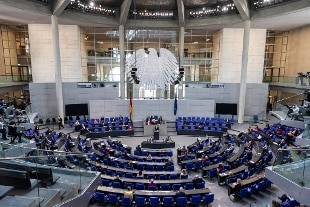Share
April 21, 2021 The Bundestag has launched the 'emergency brake' to contain the pandemic from Covid-19 giving greater powers to the government of Chancellor Angela Merkel to impose tougher measures against the coronavirus.
By a majority vote, the German parliament essentially approved a reform of the infection protection law, which allows the national government to order contact restrictions and closures, measures that until now were the exclusive responsibility of the Laender.
The 'emergency brake' provides, among other measures, such as the night curfew from 10pm to 5am when the incidence of 100 infections per 100 thousand inhabitants is exceeded over seven days, while schools will suspend teaching in the presence starting from a incidence greater than 165.
Only the parties of the ruling majority voted in favor of the anti-Covid 'emergency brake' - which was presented last week by Chancellor Angela Merkel -. The liberals of the FDP, the ultra-right of the Afd and the Linke, the party of the left, were against, for different reasons, while the Greens abstained: 342 votes in favor, 250 against and 64 abstentions.
Tomorrow the reform of the law will pass to the Bundesrat, the Laender chamber.
The vote was preceded by a very heated debate,
while a protest was held outside the Reichstag building
with over 8000 people shouting anti-lockdown slogans: there were also scuffles and single attacks on police officers after the police had decided to dissolve the demonstration given that many demonstrators were violating anti-Covid rules.
In addition to the curfew, limitations on meetings (maximum two families plus one person excluding children under the age of 14) are expected - always when 100 infections per 100 thousand inhabitants are exceeded in seven days -, the obligation of tampons twice a week for teachers as long as face-to-face lessons are valid, while stricter rules are also set for commerce: shops, gyms and cultural meeting places will have to close as soon as the incidence of 100/100 thousand in is exceeded in three consecutive days. Currently, the new rules will be in effect until the end of June.

